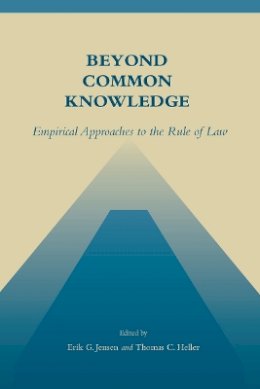Erik G. Jensen is Co-Director of the Rule of Law Program at Stanford Law School. Thomas C. Heller is Lewis Talbot and Nadine Hearn Shelton Professor of International Legal Studies at Stanford Law School.
"This volume should be mandatory reading for the directors of multilateral development banks, practitioners, scholars, policymakers, and others who hope that reform of the formal justice system will bring about political and economic liberalization." —Paul Brest, President, William and Flora Hewlett Foundation and Dean, Stanford Law School 1987-1999 "The chapters in this volume challenge the rule of law orthodoxy and introduce a much more textured account of the shifting and varying roles of formal and informal institutions that perform legal functions across countries, exploring the variegated micro-foundations of the rule of law. No scholar or policy maker should utter the words 'rule of law' without first reading this volume." —Joseph Stiglitz, Columbia University, former Chief Economist for The World Bank, and Nobel Laureate "Beyond Common Knowledge is a call to arms, to save judicial reform programming from a passionate commitment to its goals that has blinded too many of its practitioners to lessons—drawn from recent experience and scholarship—about the complex dynamics of institutional reform." —Barry Metzger, Senior Partner, Coudert Brothers LLP and formerly General Counsel, Asian Development Bank "Beyond Common Knowledge presents a wealth of new material on legal institutions in developing and post-socialist countries. No other book contains such a rich combination of description and analysis. It is an important contribution to literature on legal and judicial reform." —Richard E. Messick, Co-Director, Legal Institutions Thematic Group, The World Bank "This book deserves attention as one of the most serious efforts to date to grapple with the rapidly growing field of rule-of-law development." —Thomas Carothers, Carnegie Endowment for International Peace "This collection serves as a refreshing antidote to the boosterism of the 'rule of law,' world peace through law,' and 'international human rights law' entrepreneurs. It should be mandatory reading for any law professor embarked on an international consultation project, or establishing a development internship programme, or called upon to advise governments and development agencies."—Canadian Journal of Law and Society "The essays are all thought-provoking, and in some cases really excellent. And importantly, they add to the very limited stock of published and accessible empirical data on world legal systems."—Law and Politics Book Review

